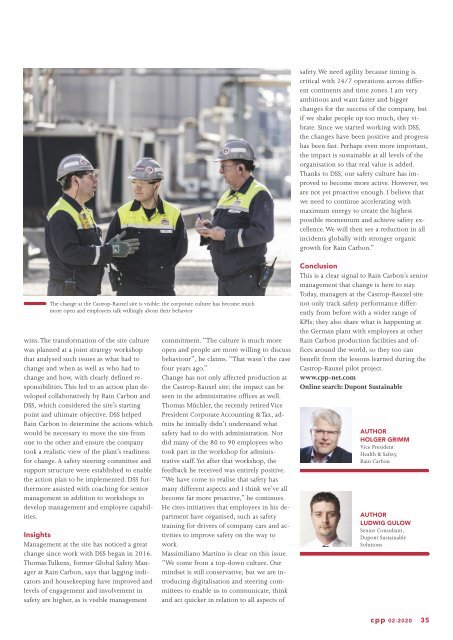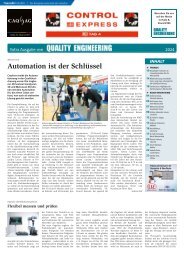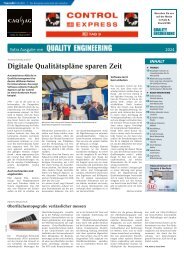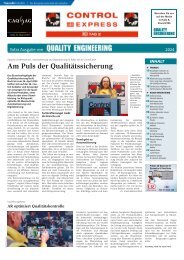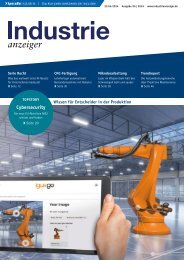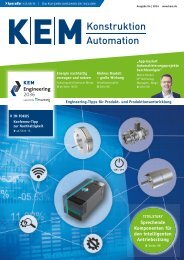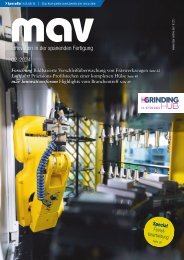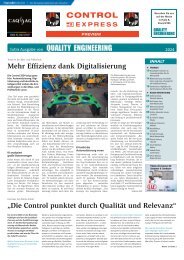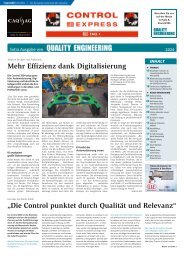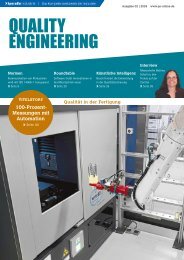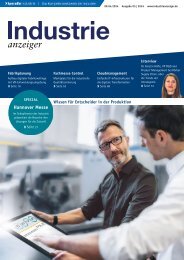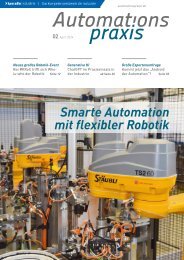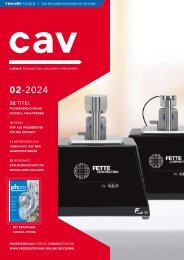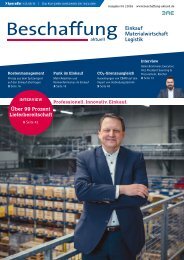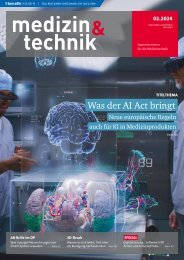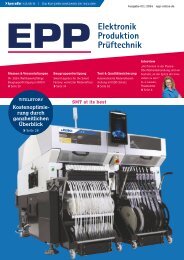cpp – Process technology for the chemical industry 02.2020
The journal cpp - Process technology for the chemical industry reports about processes, plants, apparatus and components for the chemical and pharmaceutical industry. Further topics are IT technologies, industry 4.0, digital production, MSR and automation technology and process analysis technology. The content spectrum is rounded off by explosion protection, plant safety, occupational health and safety, maintenance, site management and energy management.
The journal cpp - Process technology for the chemical industry reports about processes, plants, apparatus and components for the chemical and pharmaceutical industry. Further topics are IT technologies, industry 4.0, digital production, MSR and automation technology and process analysis technology. The content spectrum is rounded off by explosion protection, plant safety, occupational health and safety, maintenance, site management and energy management.
You also want an ePaper? Increase the reach of your titles
YUMPU automatically turns print PDFs into web optimized ePapers that Google loves.
safety. We need agility because timing is<br />
critical with 24/7 operations across different<br />
continents and time zones. I am very<br />
ambitious and want faster and bigger<br />
changes <strong>for</strong> <strong>the</strong> success of <strong>the</strong> company, but<br />
if we shake people up too much, <strong>the</strong>y vibrate.<br />
Since we started working with DSS,<br />
<strong>the</strong> changes have been positive and progress<br />
has been fast. Perhaps even more important,<br />
<strong>the</strong> impact is sustainable at all levels of <strong>the</strong><br />
organisation so that real value is added.<br />
Thanks to DSS, our safety culture has improved<br />
to become more active. However, we<br />
are not yet proactive enough. I believe that<br />
we need to continue accelerating with<br />
maximum energy to create <strong>the</strong> highest<br />
possible momentum and achieve safety excellence.<br />
We will <strong>the</strong>n see a reduction in all<br />
incidents globally with stronger organic<br />
growth <strong>for</strong> Rain Carbon.”<br />
The change at <strong>the</strong> Castrop-Rauxel site is visible: <strong>the</strong> corporate culture has become much<br />
more open and employees talk willingly about <strong>the</strong>ir behavior<br />
wins. The trans<strong>for</strong>mation of <strong>the</strong> site culture<br />
was planned at a joint strategy workshop<br />
that analysed such issues as what had to<br />
change and when as well as who had to<br />
change and how, with clearly defined responsibilities.<br />
This led to an action plan developed<br />
collaboratively by Rain Carbon and<br />
DSS, which considered <strong>the</strong> site’s starting<br />
point and ultimate objective. DSS helped<br />
Rain Carbon to determine <strong>the</strong> actions which<br />
would be necessary to move <strong>the</strong> site from<br />
one to <strong>the</strong> o<strong>the</strong>r and ensure <strong>the</strong> company<br />
took a realistic view of <strong>the</strong> plant’s readiness<br />
<strong>for</strong> change. A safety steering committee and<br />
support structure were established to enable<br />
<strong>the</strong> action plan to be implemented. DSS fur<strong>the</strong>rmore<br />
assisted with coaching <strong>for</strong> senior<br />
management in addition to workshops to<br />
develop management and employee capabilities.<br />
Insights<br />
Management at <strong>the</strong> site has noticed a great<br />
change since work with DSS began in 2016.<br />
Thomas Tulkens, <strong>for</strong>mer Global Safety Manager<br />
at Rain Carbon, says that lagging indicators<br />
and housekeeping have improved and<br />
levels of engagement and involvement in<br />
safety are higher, as is visible management<br />
commitment. “The culture is much more<br />
open and people are more willing to discuss<br />
behaviour”, he claims. “That wasn’t <strong>the</strong> case<br />
four years ago.”<br />
Change has not only affected production at<br />
<strong>the</strong> Castrop-Rauxel site; <strong>the</strong> impact can be<br />
seen in <strong>the</strong> administrative offices as well.<br />
Thomas Müchler, <strong>the</strong> recently retired Vice<br />
President Corporate Accounting & Tax, admits<br />
he initially didn’t understand what<br />
safety had to do with administration. Nor<br />
did many of <strong>the</strong> 80 to 90 employees who<br />
took part in <strong>the</strong> workshop <strong>for</strong> administrative<br />
staff. Yet after that workshop, <strong>the</strong><br />
feedback he received was entirely positive.<br />
“We have come to realise that safety has<br />
many different aspects and I think we’ve all<br />
become far more proactive,” he continues.<br />
He cites initiatives that employees in his department<br />
have organised, such as safety<br />
training <strong>for</strong> drivers of company cars and activities<br />
to improve safety on <strong>the</strong> way to<br />
work.<br />
Massimiliano Martino is clear on this issue.<br />
“We come from a top-down culture. Our<br />
mindset is still conservative, but we are introducing<br />
digitalisation and steering committees<br />
to enable us to communicate, think<br />
and act quicker in relation to all aspects of<br />
Conclusion<br />
This is a clear signal to Rain Carbon’s senior<br />
management that change is here to stay.<br />
Today, managers at <strong>the</strong> Castrop-Rauxel site<br />
not only track safety per<strong>for</strong>mance differently<br />
from be<strong>for</strong>e with a wider range of<br />
KPIs; <strong>the</strong>y also share what is happening at<br />
<strong>the</strong> German plant with employees at o<strong>the</strong>r<br />
Rain Carbon production facilities and offices<br />
around <strong>the</strong> world, so <strong>the</strong>y too can<br />
benefit from <strong>the</strong> lessons learned during <strong>the</strong><br />
Castrop-Rauxel pilot project.<br />
www.<strong>cpp</strong>-net.com<br />
Online search: Dupont Sustainable<br />
AUTHOR:<br />
HOLGER GRIMM<br />
Vice President<br />
Health & Safety,<br />
Rain Carbon<br />
AUTHOR:<br />
LUDWIG GULOW<br />
Senior Consultant,<br />
Dupont Sustainable<br />
Solutions<br />
<strong>cpp</strong> 02-2020 35


